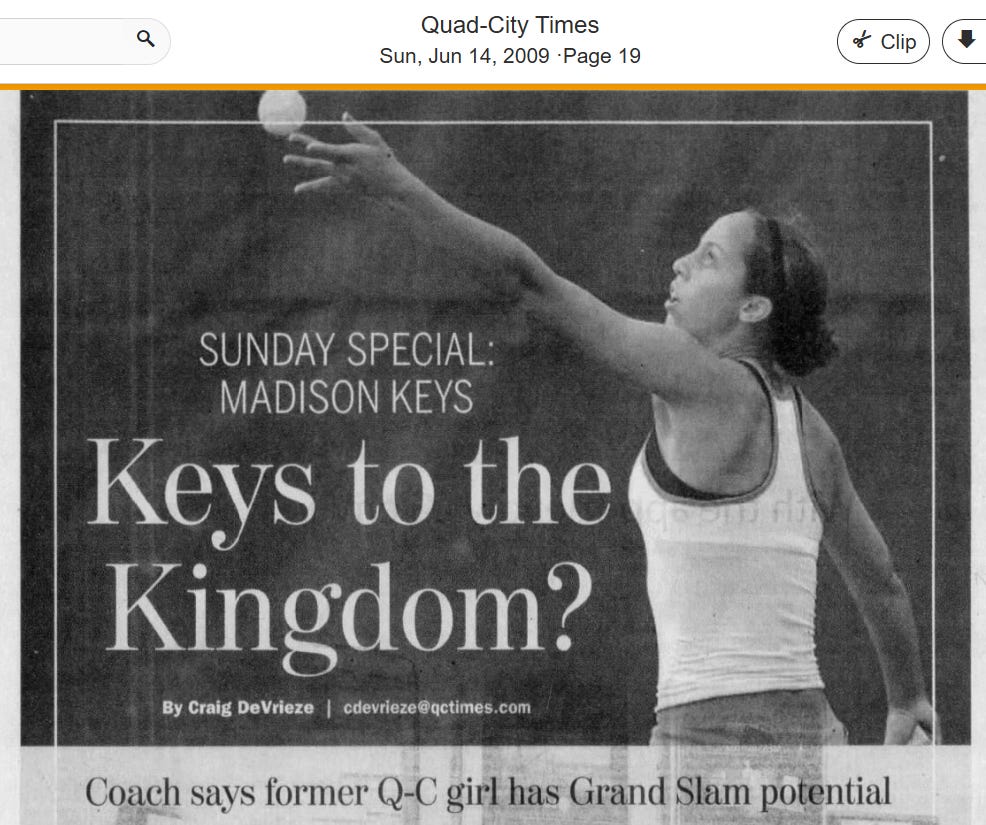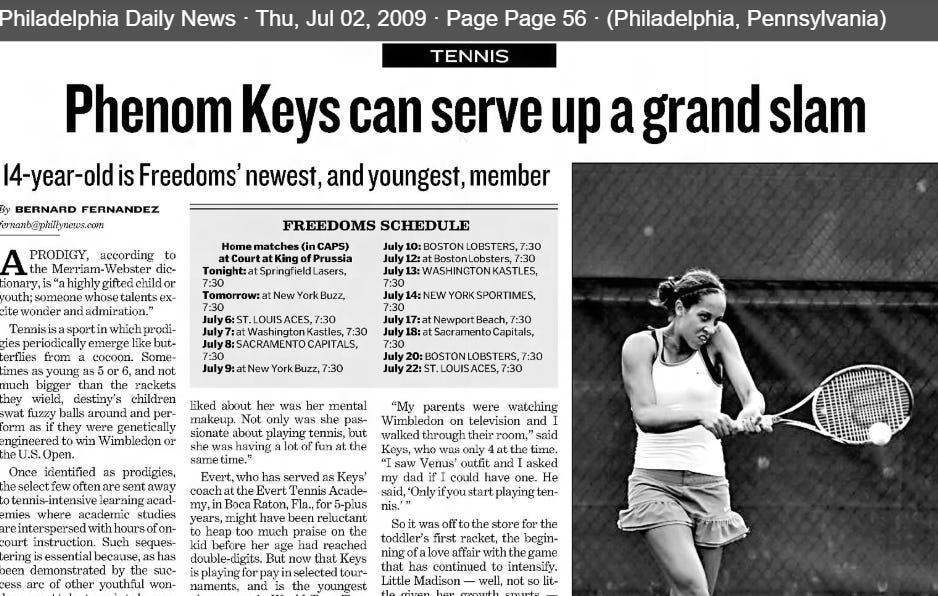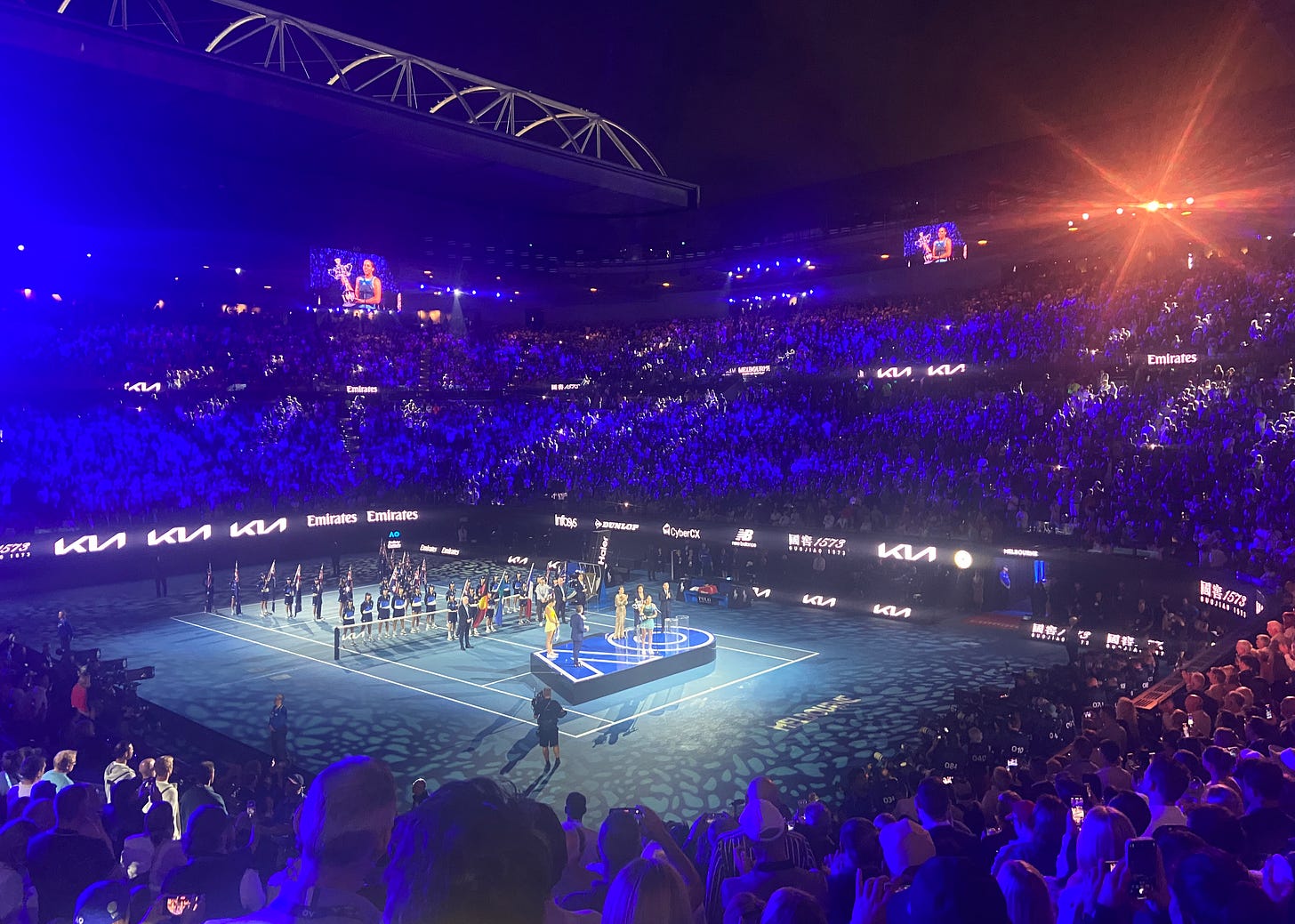Major Keys
2025 Australian Open champion Madison Keys finally fulfilled Grand Slam expectations after letting go of them.
MELBOURNE, Australia — Madison Keys’ first racquet was bought at this Walgreens in Milan, Illinois in 1999, when she was four years old.

Unlike most future stars who are urged into tennis by their parents, four-year-old Keys had set herself on the path into the sport when she walked past the family’s television while Wimbledon was on weeks earlier. She spotted Venus Williams in a white dress with blue trim and wanted one for herself.
“It was a cutout dress, very racy, and it showed her back,” her mother, Christine Keys, told me in 2017. “[Madison] was just walking through and she goes, ‘Oh, can I get one of those dresses?’ I said, ‘Well, you have to play that sport.’ She said, ‘Oh, okay! Let’s do that!’ Two weeks later, she goes: ‘Hey, when am I going to get that dress? And the stick?’”
That Walgreens “stick” was the unassuming start to a life in tennis that soon escalated for Keys and her family. When she was 10, the family uprooted from Illinois to Boca Raton, Fla. so she could train at the Evert Tennis Academy.
Keys won her first nationwide tournament “gold ball” at the USTA Girls’ National 12-and-under Clay Court Championship, and then also won the 12-and-under division at the Junior Orange Bowl.
Those tween-aged wins were enough to send the first hype machines into overdrive around Keys.
“At 12 they said she was going to win a Slam by the time she was 18,” Christine Keys told me. “How unfair is that?”
In brief defense of the hype, Keys was certainly a precocious talent. She turned professional on her 14th birthday, and became one of the youngest ever to win a WTA match two months after that when she beat 21-year-old Alla Kudryavtseva at a small WTA event in Ponte Vedra Beach, Florida.
But excitement after those small steps was rarely modulated, leading to long-leaping predictions.
The first on-the-record mention I could find of Madison Keys being discussed as a potential major champion was a few months after that, when John Evert of the Evert Academy told Keys’ hometown paper The Quad City Times “I think Madison has the potential to win Slams,” a quote which became the subhed to their profile of the 14-year-old.
14-year-old Keys also made headlines again later in that 2009 summer when she beat recent Wimbledon champion Serena Williams 5-1 in a World TeamTennis match. Anyone who ever watched Serena in a World TeamTennis match would know that it was hardly ever a Centre Court-caliber effort level from her out there, but the feat added heat to Keys’ already hot stock, which IMG, Nike, and Wilson had bought shares in early on.
Bjorn Fratangelo, Keys’ current coach and recent husband, had been a junior major champion himself when he won the 2011 French Open boys’ title, but said this week that he couldn’t relate to the intensity of fanfare Keys would have heard.
“I don't know what that pressure is like of people telling you at 14 years old, like, ‘Hey, you're going to have Grand Slam titles when you're 21, 22—you're going to have multiple,’” Fratangelo said. “Nobody has a crystal ball; you don't know that. So I can't imagine what that pressure is going to be like. Thank God I didn't have it, honestly.”
For the first fifteen or so years after those prognostications were first made, Keys struggled by the high bar for success that others had set for her.
“It definitely started pretty young,” Keys said on Saturday night when I asked her about the hype. “Probably 11, 12, something like that. It obviously was meant to be confidence-building and all of that.”
But as she entered dozens of majors and still remained “slamless,” the long-term failure to meet the expectations of others began to wear on Keys.
“You're getting older, you're obviously in the later stages of your career, it kind of feels like: Will this ever actually happen?” Keys continued. “If it doesn't happen, I didn't live up to what everyone told me I should have done. So I think it kind of almost felt like it went from being something positive to something that was almost, like, a little bit of a panic: ‘Why hasn't it happened yet? Why haven't I been able to do it?’
“It really started to kind of weigh on me more where it was: ‘What if I never do it? If I don't do it, am I considered a failure?’ There was a lot of stuff that I had to work through personally just with all of that, just because of all of the pressure I was putting on myself with that.”
Keys, ironically, had to learn to let go of the possibility of winning a Grand Slam in order to make it possible.
“From a pretty young age, I felt like if I never won a Grand Slam, then I wouldn't have lived up to what people thought I should have been,” Keys said Saturday night. “That was a pretty heavy burden to kind of carry around. So I finally got to the point where I was proud of myself and proud of my career, with or without a Grand Slam. I finally got to the point where I was OK if it didn't happen. I didn't need it to feel like I had a good career or that I deserved to be talked about as a great tennis player. I feel like finally letting go of that kind of internal talk that I had just gave me the ability to actually go out and play some really good tennis to actually win a Grand Slam.”
Win a Grand Slam title she did: playing fearlessly and freely, Madison Keys defeated top-ranked Aryna Sabalenka, the two-time defending champion, 6-3, 2-6, 7-5 to win her first major on Saturday night at the Australian Open, fulfilling—and exorcising— nearly two decades of external expectations that had become internal pressure.
There has never been a teen prodigy of Keys’ wattage who finally got their major payoff so late.
Two of my favorite “patience is a virtue” statistics that Madison Keys achieved with her win tonight:
At 29 years and 343 days old, Keys is the fourth-oldest first-time women’s singles champ in the Open Era behind only: Flavia Pennetta (2015 U.S.
Open – 33 years, 199 day); Ann Jones (1969 Wimbledon – 30 years, 261 days) and Francesca Schiavone (2010 French Open – 29 years,
347 days—just four days older) .
Keys won a major in her 46th Grand Slam appearance; only two women needed more appearances for their maiden major singles title during the Open Era: Flavia Pennetta on her 49th try at the U.S. Open 2015; and Marion Bartoli on her 47th try at Wimbledon 2013.
Pennetta and Bartoli, though, both got enormous help from upsets elsewhere in the draw in those tournaments; Keys entirely paved her own road at the 2025 Australian Open, becoming the first woman to beat the No. 1 (Sabalenka) and No. 2 (Iga Swiatek in the semifinals) en route to a major title since Svetlana Kuznetsova at the 2009 French Open (No. 1 Dinara Safina and No. 2 Serena Williams).
But even before those huge wins over Swiatek and Sabalenka, Keys also faced a seriously loaded draw through the middle of this tournament as well, beating No. 10 Danielle Collins, No. 6 Elena Rybakina, and No. 28 Elina Svitolina.
Thinking back, I don’t think there’s been a run through a major draw this impressive since Serena Williams at the 1999 U.S. Open, who beat five future Hall of Famers en route to her first major title: Kim Clijsters, No. 16 Conchita Martinez, No. 4 Monica Seles, No. 2 Lindsay Davenport, and No. 1 Martina Hingis.
Perhaps it’s fitting that it was only a few weeks before Serena’s historic run that the Keys family made a fateful trip to their local Walgreens.
Thank you for reading Bounces during the 2025 Australian Open and beyond! Hope you can subscribe—either free or paid—if you haven’t yet to keep up with Bounces the rest of this season! -Ben










Really happy for her: her game was so much improved this year, which I thought was evident in the Adelaide event (which she won). I'd love to see stats on her kick serve, which seems to me to be one of the most potent in the women's game - and her first isn't bad either. And as you say, she had to come through an incredibly tough draw. Kudos though: she played the two best matches of the whole women's tournament.
Nice piece. Good perspective on how unusual it is for someone with that kind of early hype to win one at her age. ... Sorry, but one unrelated gripe, not directed at you: It's about the press conference -- the collective result of it. There were a lot of good individual questions. Yours about when she first started hearing people saying she would win a Slam was interesting and produced a revealing response. I share the journalists' interest in her journey. But the questions were very similar to each other. Unless I missed it, there was not one question about the actual match. She didn't say a word about tactics, strategy, execution -- nothing about the match -- because she wasn't asked to. They did play a tennis match, and it happened to be a really good one. I would like to know more about how she approached it. Maybe there's no way to fix this, or maybe you guys could draw straws and whoever gets the short one has to ask about the actual match.